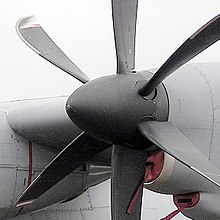Dowty Propellers
| File:Dowty logo.gif | |
| Company type | Subsidiary |
|---|---|
| Industry | Aerospace |
| Founded | 1937 as Rotol Airscrews |
| Founders | Rolls-Royce Limited Bristol Aeroplane Company |
| Headquarters | , |
| Parent | GE Aviation |
| Website | dowty |
Dowty Rotol was a British engineering company based in Staverton, Gloucestershire and specialised in the manufacture of propellers and propeller components. Following a series of changes of ownership, the original Dowty Rotol facility at Staverton is now owned by the Safran Group, operating as part of its Messier-Bugatti-Dowty Landing Gear subsidiary. Propeller design and manufacture was moved a few hundred metres down the road when the company was split into business units under its Dowty ownership in the early 1990s. 16 January 2007, Dowty Propellers became part of GE Aviation Systems through GE buying Smiths Group’s aerospace division.[1][2]
History

The company was formed as Rotol Airscrews in 1937 by Rolls-Royce and Bristol Engines to take over both companies' propeller development,[3] the market being too small to support more than one company. The name is a contraction of "ROlls-Royce" and "BrisTOL".[3] Rotol's propellers were always considered leading edge, its models equipping the Hawker Hurricane, Supermarine Spitfire, and many other Second World War-era aircraft.[3] By the end of the war it had introduced the first five-bladed propeller to see widespread use, used on late-model Spitfires. In 1943 the company changed its name from Rotol Airscrews Limited to Rotol Limited, and in 1952 it acquired British Messier Limited, a specialist in landing gear and hydraulics.
In 1958, Bristol Aeroplane and Rolls-Royce agreed to sell Rotol and British Messier to the Dowty Group.[4] By 1959 Rotol and British Messier along with Dowty Equipment and Dowty Fuel Systems became part of the new Dowty Aviation Division based at Cheltenham.
In 1968, the company introduced the first fibreglass propellers, which went on to see widespread use.[3] Since then it has migrated to carbon fibre, and remains a leader in propeller design.
On 5 February 2015, a fire at Dowty's Staverton facility caused severe damage to 80% of the factory building, destroying the main production line.[5] A facility at Vantage Point Business Village in Mitcheldean, Gloucestershire, was selected for the company's interim propeller blade manufacturing.[6]
Operations

Dowty propellers are used on many turboprop feederliners, including the Dash 8Q400, Saab 340 and Saab 2000, and on turboprop transport aircraft such as later models of the C-130J and Alenia C-27J. Dowty Propellers can also be found on LCACs used by the militaries of several countries. The US National Air and Space Museum's Udvar Hazy Center, Virginia, has a Dowty propeller on display.
See also
References
- ^
"agreeing to dispose of its aerospace division to the giant US conglomerate General Electric for £2.45bn ;
from google (ge buy smith group aerospace) result 5". - ^
"2007 – Dowty Propellers becomes part of GE through the company's acquisition of Smiths Group's aerospace division ;
from google (ge buy dowty rotol) result 1". - ^ a b c d Gloucester Transport History
- ^ "Airscrew Firm Sold To Dowty Group". News. The Times. No. 54338. London. col C, p. 10. template uses deprecated parameter(s) (help)
- ^ "Dowty fire: Gloucestershire factory 'severely damaged'". BBC News. 5 February 2015. Retrieved 16 July 2017.
- ^ "Dowty Propellers selects new interim production facility location and advances its recovery plan". Dowty Propellers. 9 April 2015. Retrieved 16 July 2017.
External links
- Information and pictures: Dowty Propellers plant in Gloucester, UK, from Smiths Aerospace web site.
- GE Aviation - Dowty propellers
- Grace's Guide "Dowty Rotol of Staverton, Churchdown"
- Aerospace companies of the United Kingdom
- Aircraft component manufacturers of the United Kingdom
- Aircraft propeller manufacturers
- British companies established in 1937
- Companies based in Gloucestershire
- Engineering companies of the United Kingdom
- Manufacturing companies established in 1937
- Science and technology in Gloucestershire
